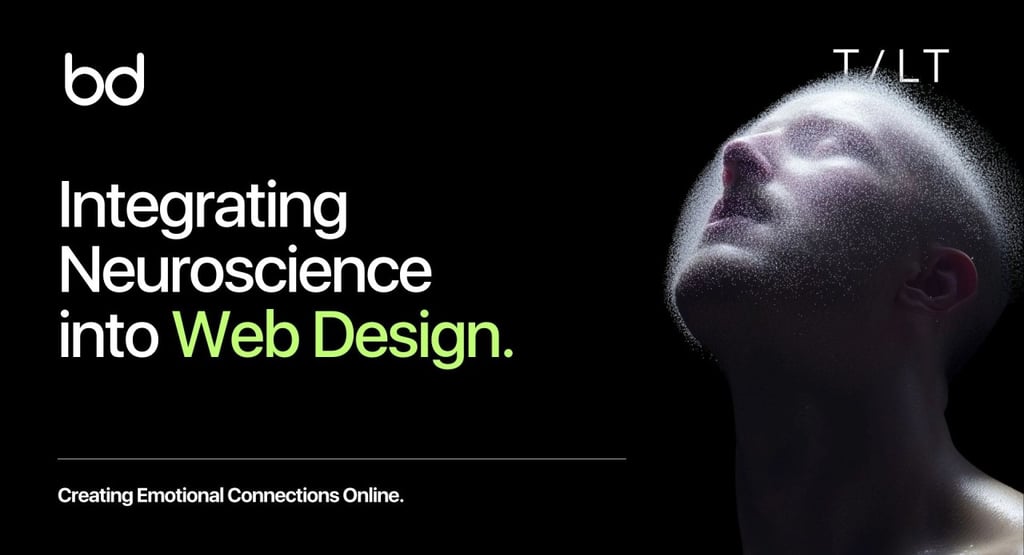Integrating Neuroscience into Web Design: Creating Emotional Connections Online
This newsletter explores how neuroscience shapes visual design, why it matters across industries, and how integrating sonic branding deepens emotional connections online.
Brand Blinks Global
4 min read


Attention is fleeting, and emotional resonance is scarce.
Yet, some websites captivate, engage, and convert consistently. Their secret? Neurodesign, an innovative fusion of neuroscience, psychology, and cutting-edge website design and development that transforms how brands influence and connect emotionally with users.
This newsletter explores how neuroscience shapes visual design, why it matters across industries, and how integrating sonic branding deepens emotional connections online.
The Science Behind Neurodesign: The Brain as the Real User
Neuroscience proves that the brain processes visuals, color, layout, and motion within milliseconds, well before conscious thought. Visitors’ initial reactions to your site are emotional and visceral, determining whether they trust, explore further, or bounce. bejamas
Don Norman whom many consider the father of emotional design, identified three emotional levels every site must address:
Visceral: Instant, subconscious reactions triggered by shapes, color, and imagery.
Behavioral: Emotional responses during navigation and usability.
Reflective: Deep, lasting connections formed through brand story and meaning. interaction design
Elite branding and designing experts carefully orchestrate these emotional layers for maximum impact.
Core Neuroscience Principles to Guide Visual Web Design
Visual Hierarchy and Clarity: The brain craves order. Research confirms that organized layouts with clear brand visuals build trust, direct user attention, and increase engagement. Headlines and whitespace calm the mind, making sites easier to digest.
Color Psychology: Color enhances mood and builds brand recognition, up to 80% in some studies. Blue soothes (finance/tech), green reassures (health), and red excites (retail). A thorough brand audit can assess if your palette aligns emotionally with your brand promise.
Cognitive Load & Simplicity: The brain prefers simplicity; clutter triggers confusion and bounce. Neuroscience-backed designs minimize distractions, using guided flows with minimal choices to drive confident actions. Familiar UI patterns reduce learning curves and frustration.
Emotionally Resonant Content: Compelling content writing and copywriting weaves facts with feeling, crafting narratives that resonate with subconscious desires and motivations.
Emotional Connection by Industry: Tailoring Neurodesign
Healthcare: Calm colors, clear information, and empathetic imagery build trust and ease apprehension.
E-Commerce: Bold colors, urgency triggers, and clear CTAs drive excitement and conversions.
SaaS & Technology: Minimalism, whitespace, and frictionless onboarding boost credibility and reduce user anxiety.
Education: Gamified feedback and dynamic visuals increase engagement and knowledge retention.
The Power of Sound: Sonic Branding Complements Visual Design
Sound triggers emotions uniquely and memorably. Brands that incorporate consistent, custom sonic logos enjoy higher recall and emotional attachment. Sonic branding activates different brain regions, reinforcing identity beyond visuals.
Effective sonic branding’s pillars include:
Congruence - sound matches brand personality and visual style.
Ownership - custom audio is unique and scalable.
Repetition - consistent audio at every touchpoint deepens memory.
Tools & Techniques: Bringing Neuroscience to Life
Applying neuroscience requires:
Eye-tracking & heatmaps to optimize visual flow.
Biometric feedback to fine-tune emotional impact.
Behavioral A/B testing to improve conversion and engagement.
Deep ux audits reveal subconscious friction and guide design iteration.
Real-World Impact: Neurodesign in Action
A finance brand redesigned its onboarding flow using neuroscience insights, reducing choice paralysis and adding emotional urgency cues. The result: a 24% uplift in conversions and doubled repeat visits.
From Research to Strategy: Neuroscience as a Brand Framework
Neurodesign isn’t a plug-and-play fix; it must align with a unified brand strategy and development. Leading brands work with expert branding consulting teams to embed cognitive insights into every digital touchpoint.
Future Trends: AI, Personalization, and Emotional Metrics
Neurodesign is evolving with AI and personalization, allowing brands to tailor emotional experiences in real time, a crucial differentiator. Leading demand generation strategies now measure emotional engagement as a key performance indicator, scaling human-centric design across industries.
Design for the Mind, Sound for the Soul
Neuroscience and sonic branding usher in a new age of digital emotional connection. Brands that invest in this thoughtful synthesis become memorable, trusted, and beloved.
Is your digital presence engineered for emotion, or just functionality? Let Brand Blinks Global guide you in creating lasting bonds in the hearts and minds of your audience.
The Brand Blinks Approach
From diagnostic brand audits and detailed ux audits to strategic brand strategy and development, and creative execution. We build digital and sonic identities tailored to the human brain and emotional needs.
Our integrated approach guarantees experiences that feel as good as they look and perform.
Brand Blinks Global | Web and Audio Design Powered by Cognitive Science and Creativity




© 2026 BRNDxMORPH Media WWD Private Limited. All rights reserved.
Brand Blinks Global® | BBG is an independent global brand consulting and transformation company.
The trademarks, logos, and service marks displayed on this site are the property of their respective owners.
"Brand Blinks Global® | BBG," "Brand Blinks®," "Made for the Uncommon®," and the "bd®" logo are trademarks or registered trademarks of BRNDXMORPH Media WWD Private Limited.


